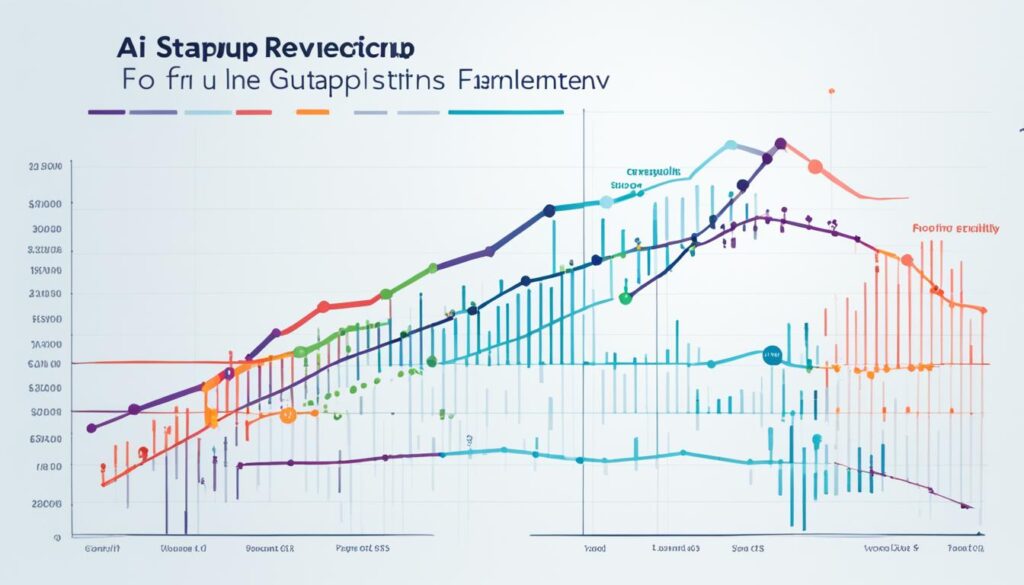The world of artificial intelligence, or AI, is changing fast. Venture capitalists, or VCs, are putting more money into AI startups. Yet, figuring out how to judge these new businesses is tricky. In this piece, we’ll look at how VCs think when they see an AI startup. And we’ll offer advice for startup leaders who want VC support.
Ever thought about What key factors do VCs consider when evaluating AI startups? Understanding VCs’ decisions is key to getting the funds your AI startup needs. Let’s look at the insights that could make your startup stand out. Especially when it comes to VC funding.
Key Takeaways
- VCs are really looking at AI startups, but figuring them out can be hard.
- To get funds, AI startup founders must know what VCs look for.
- VCs closely check the tech team’s skills, the AI’s potential, and how the business plans to make money.
- Making a strong pitch, forming connections, and going through checks can boost an AI startup’s chance of getting VC funds.
- Keeping with changes in the VC world and changing your plans as needed can help your AI startup do better.
Understanding the VC Landscape for AI Startups

The world of venture capital (VC) is changing fast due to new AI technology. VCs see big potential in AI and want to invest in startups. This change has made it easier for AI entrepreneurs to get the support they need.
The Rise of AI and Its Impact on Venture Capital
AI is changing how venture capital works. VCs are excited by AI’s progress, like in machine learning and computer vision. They see these technologies as ways to change industries and want to invest in startups that use them.
There’s a lot of money going into AI, so competition for funding is high. Startups need to be both technically great and business-savvy to stand out. VCs want to support startups that understand how to make money from their AI ideas.
Key Factors VCs Consider When Evaluating AI Startups
VCs look at more than just a startup’s AI tech. They also check the team’s strength, how unique the solution is, and the market potential. A startup’s data strategy and how it plans to grow are also really important.
They also like startups that have already started proving themselves. A strong start, clear commercial plans, and putting AI tech to use are very appealing. VCs look for startups that can deliver value and grow sustainably.
How do VCs evaluate AI startups

Venture capitalists (VCs) pay a lot of attention to an AI startup’s technical team. They know that a company’s success with AI relies on the team’s strength. This means they must be able to create, launch, and grow the AI technology.
The Importance of a Strong Technical Team
VCs check out the AI startup’s technical team in detail. They want to know about the team’s skills and past work. Especially important is their knowledge of AI areas like machine learning and computer vision.
The team should be great not just at making AI tech but also at applying it well. VCs like to see how the team solves problems and adapts. These skills are key in AI’s complex development and use.
Assessing the AI Technology and Its Potential
VCs also look closely at the AI tech itself. They want to know if it’s special, doable, and impactful. The technology’s core parts and how it’s built are carefully examined to see its strength and future use.
They also think about where and how the AI tech could be used. And if it’s better than what’s already out there. Meeting market needs and growing with time is crucial. They look for a plan on how the tech will keep improving.
VCs examine both the team and the tech to pick successful AI startups. They search for expertise, creativity, and the ability to keep up in the AI world’s rapid changes.
The Business Model and Market Opportunity

Venture capitalists (VCs) look at more than just the technology when they check out AI startups. They also focus on the business model and the size of the market. VCs aim to find AI companies that can take a big slice of a growing market.
Identifying a Compelling Use Case
VCs pay close attention to how unique and clear an AI startup’s use case is. They expect to see an AI solution that clearly addresses a big problem. This problem should be significant for customers or end-users. VCs also look into the target market’s size and how easy it is for the startup to grow and stand out from the crowd.
Evaluating the Competitive Landscape
VCs not only focus on the use case but also the competition. They want a deep understanding of the market’s status, who the players are, and where the startup fits in. They study what the competitors do well or not, the challenges for new entries, and the startup’s potential to change the game.
By diving into the business model and market opportunity, VCs can judge an AI startup’s future success. Understanding these aspects helps VCs pick the startups that could grow big and offer great returns.
Traction and Proof of Concept
AI startups aiming for venture capital (VC) must show real traction and proof of concept. VCs focus not just on the AI tech’s skills but also on the startup’s execution and market validation. They want to see you’re not just talking but actually moving the technology forward.
VCs look at whether the AI startup is progressing well with its tech. Signs include engaging with customers or users, having successful pilot projects, or making some early money. The aim is to show that your startup is more than just ideas; it’s adding real value to the market.
| Traction Metrics | Proof of Concept Indicators |
|---|---|
|
|
“Traction and proof of concept are critical for AI startups seeking VC funding. Investors want to see tangible evidence that the technology works, and that there is a viable market opportunity to be captured.”
Showing traction and proof of concept helps AI startups prove they are on the right path. It validates their tech and boosts confidence in their growth potential. This approach can greatly help in winning the VC funds you need to grow your business.
Intellectual Property and Data Strategy

When VCs look at AI startups, how they protect their intellectual property and use data is key. VCs understand keeping the heart of the AI tech safe is vital for any AI business.
Protecting Your AI Technology
VCs like to see that AI startups have secured their intellectual property. This is through patents and copyrights. It shows that the tech is special and can be defended. It also proves the startup is ready to guard its most important parts. Startup founders should explain how they’ll protect their IP and how this fits with their company’s big picture.
Data Acquisition and Management
In AI, how data is gathered and handled is crucial. VCs check how startups plan to use data for their AI. This involves gathering, sorting, and using data to improve their AI. The companies that have smart plans for handling data get noticed by investors.
AI startups set themselves apart by dealing with intellectual property well and having a solid data strategy. This can boost their chances of getting funding from VCs. Telling investors clearly about their IP and data plans is important for these technology-driven companies.
Scalability and Growth Potential

Venture capitalists (VCs) look closely at how AI startups can grow big. They focus on if the company can make advanced AI tech and grow their market share.
Addressing Potential Bottlenecks
VCs require AI startups to have a plan for challenges they might face when growing. They need to fix any tech or work issues ahead of time. This ensures they are ready for quick growth.
Exploring Expansion Opportunities
VCs also want to know how AI startups will find new ways to grow. This might mean targeting new markets, adding new products, or forming key partnerships. Clear plans for growth catch investors’ eyes.
Evaluating scalability and growth potential helps VCs pick winners. It’s a key part of their process to back startups that can grow and lead the market.
Financial Projections and Funding Requirements

Venture capitalists (VCs) look closely at the financial projections and funding needs of AI startups. They want to see if these companies are financially stable and can grow in the long run. VCs need to know if the startup can make its vision a reality.
Building a Solid Financial Model
When seeking VC funding, founders must show a clear financial model. It should explain the startup’s future income, costs, and how it manages money. The model must make sense and show how the startup will make money and grow. VCs will check if the funding the startup asks for matches its plans and needs.
Determining the Right Funding Strategy
VCs also check the startup’s funding plan. Founders should explain how much they need, how they’ll spend it, and the goals they’ll reach with the money. A strong, clear plan that matches the startup’s financial future impresses VCs. It shows the startup’s serious about its growth and success.
By showing a clear financial model and funding strategy, AI startups can catch VCs’ interest. This increases their chance of getting the funding they need. It helps them grow and make the most of their AI technology.
The Pitch and Presentation

As AI startups look for venture capital, a great pitch and presentation are key. Founders need to tell a compelling story. This story needs to show their AI’s skills and answer the tough questions VCs have.
Crafting a Compelling Narrative
When talking to VCs, AI startups must create a story that grabs their attention. This story should explain what problem the startup solves and why it’s special. It should also show the big market opportunity. Crafting a captivating tale lets founders share their dream, energy, and plan.
Addressing Common Concerns and Objections
AI startups also have to be ready for questions and worries that VCs might bring up. They could ask how big your tech can get, if you can protect your ideas, or about data. Another concern is about facing rules. Being ready for these issues shows VCs they can trust you. This could help you get the funding you need for your startup.
The pitch and presentation offer AI startups a big chance. It’s a time to prove how they stand out, set themselves apart, and show where they’re headed. With a good story and handling common issues, founders can better their odds of winning the venture capital they need for their AI breakthroughs.
Building Relationships and Networking
For AI startups, creating strong relationships is key. It’s also good to get involved in the industry. This can help founders find VC funding. Going to events and joining forums makes them more visible to investors.
Leveraging Your Network
Using your personal and work connections can be very helpful. Talk to past co-workers, teachers, and others in the field. They might introduce you to VCs or share advice. Don’t forget about events and meetups. They’re great for meeting potential investors.
Engaging with the AI and VC Communities
Getting active in the AI and VC worlds is very important. Joining groups, helping in forums, and sharing your knowledge through blogs or talks can go a long way. It shows you know your stuff and gets you noticed by investors.
So, by making these important friendships and connections, founders can better their chances of getting the support they need. This support comes from VCs who see the great future in their technology.
Due Diligence and Negotiation

Before investing in AI startups, VCs complete thorough checks and evaluations. They look deeply into the company’s technology, business model, and financials. This confirms the investment fits the VC’s goals and risk tolerance.
Preparing for Due Diligence
For AI startups looking for funding, being ready for deep checks is crucial. They should gather all necessary documents and financial information. They can expect questions about their technology, the market, and how they plan to grow.
Navigating Term Sheets and Negotiations
After due diligence, VCs offer a term sheet with investment conditions. This is when discussions on the terms start. Founders need to understand the term sheet’s details and negotiate for what’s best for their startup.
Being ready for due diligence and skilled in negotiations are key. They can affect the investment deal and the startup’s relationship with the VC. By handling these steps well, AI startup founders can get the funding they need.
Conclusion
Understanding how venture capitalists (VCs) evaluate AI startups is complex yet important. The AI field is always changing, making it crucial for VCs to keep up. They look at the startup’s technical team, AI technology’s quality, the business model, and its ability to grow. This helps them choose which AI ventures to invest in.
To attract VC funding, AI startups need to tackle these aspects head-on. They should form a skilled team and create an innovative AI product. This product should meet a clear need and have a strong business model. Showing progress, a smart plan for intellectual property, and how the business can grow are also key.
Knowing what VCs look for and acting on it can help startups get the funding they need. Building and keeping up good connections, being active in the AI and venture capital sectors, and handling negotiations well are ways to stand out. This can make the difference for an AI startup looking to grow.
